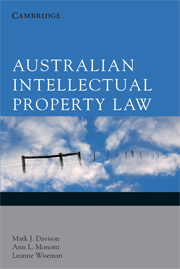Book contents
- Frontmatter
- Contents
- Preface
- Acknowledgements
- Table of statutes
- Table of cases
- 1 Introduction
- 2 Passing off
- 3 Registered trade marks
- 4 Exploitation of registered trade marks
- 5 Copyright: Introduction
- 6 Subsistence of copyright
- 7 Authorship and first ownership, nature of the rights and duration
- 8 Exploitation, infringement and defences
- 9 Moral rights, performers' rights and circuit layouts
- 10 Designs
- 11 Equitable doctrine of breach of confidence
- 12 Patents for inventions: introduction
- 13 Patents for inventions: validity
- 14 Patents for inventions: allocation of rights and ownership, the Register and dealings
- 15 Patents for inventions: exploitation, infringement and revocation
- 16 Plant breeder's rights
- 17 Remedies and miscellaneous issues
- Appendix
- Index
9 - Moral rights, performers' rights and circuit layouts
- Frontmatter
- Contents
- Preface
- Acknowledgements
- Table of statutes
- Table of cases
- 1 Introduction
- 2 Passing off
- 3 Registered trade marks
- 4 Exploitation of registered trade marks
- 5 Copyright: Introduction
- 6 Subsistence of copyright
- 7 Authorship and first ownership, nature of the rights and duration
- 8 Exploitation, infringement and defences
- 9 Moral rights, performers' rights and circuit layouts
- 10 Designs
- 11 Equitable doctrine of breach of confidence
- 12 Patents for inventions: introduction
- 13 Patents for inventions: validity
- 14 Patents for inventions: allocation of rights and ownership, the Register and dealings
- 15 Patents for inventions: exploitation, infringement and revocation
- 16 Plant breeder's rights
- 17 Remedies and miscellaneous issues
- Appendix
- Index
Summary
Introduction
This chapter examines some of the rights that are closely associated with but not usually seen as part of copyright law. The first section examines the moral rights which are given to creators. This is followed by an examination of the protection given to performers under the Copyright Act 1968 (Cth). The law in this area has undergone a number of recent changes, principally as a result of the Australia – USA Free Trade Agreement 2004 which extended the protection to include control over authorised sound recordings of performances. The moral rights which have been given to performers will also be discussed. It should be noted that although the provisions dealing with performers' moral rights are set out in the Copyright Act 1968 (Cth), they will not enter into force until Australia accedes to the WIPO Performances and Phonograms Treaty (WPPT) (1996). Finally, this chapter considers circuit layout rights and the public and educational lending rights.
Moral rights
One of the recurring themes of twentieth-century Australian copyright law was the question of whether Australia complied with its requirements under the Berne Convention to protect the moral rights of authors. While the government and many others argued that the existing laws of defamation and passing off provided adequate protection, creators and commentators continually expressed their dissatisfaction with the level of protection afforded by Australian law.4 After nearly seventy years of debate,5 the Commonwealth government capitulated in 2000 and admitted that the existing laws were ‘fragmentary and incomplete’.
- Type
- Chapter
- Information
- Australian Intellectual Property Law , pp. 296 - 319Publisher: Cambridge University PressPrint publication year: 2008



